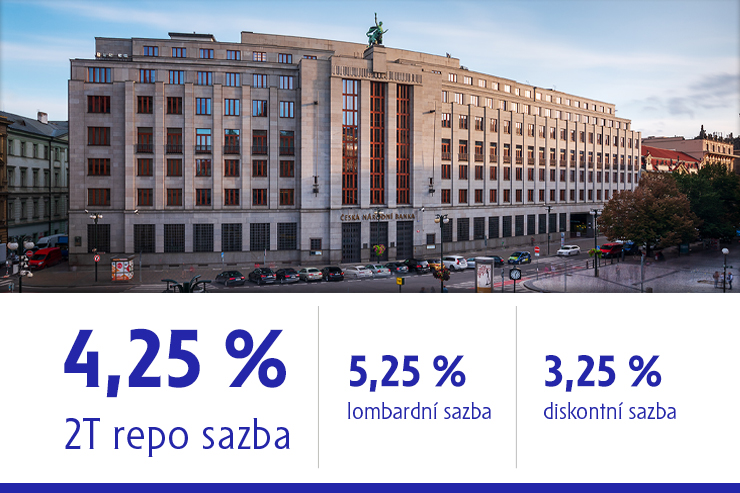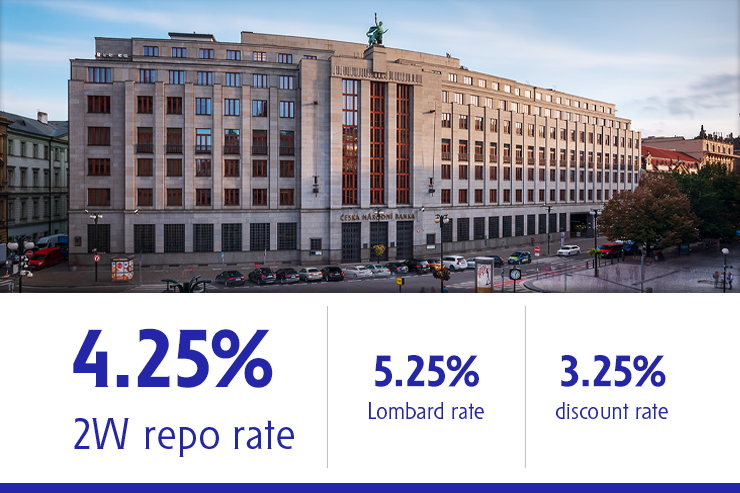Bankovní rada nadále pokračuje ve zmírněném tempu snižování úrokových sazeb, když opětovně snížila dvoutýdenní reposazbu pouze o 0,25 % na 4,25 %. Pro tento krok hlasovalo šest členů bankovní rady, zatímco jeden člen hlasoval pro snížení o 0,50 %. Trhy s tímto rozhodnutím počítaly, protože podobný pokles očekávaly už v srpnu, kdy došlo k obdobnému snížení sazeb.

Navázala tak na nedávné kroky dalších centrálních bank. Evropská centrální banka (ECB) snížila sazby o 0,25 % na svém zasedání před dvěma týdny, a minulý týden se k ní připojil i americký Federální rezervní systém (Fed), který zvolil výraznější snížení o 0,50 %. Podle Aleše Michla oba tyto kroky představují další uvolnění měnové politiky.
Guvernér ČNB Aleš Michl sám přiznává, že při snížení o 0,25 % jsou stávající úrokové sazby i nadále restriktivní. V prohlášení bankovní rady uvedl: „Bankovní rada považuje za nezbytné zachovat přísnou měnovou politiku a další snižování sazeb pečlivě posuzovat.“ Tato slova jsou identická s prohlášením po srpnovém zasedání. Dále varoval, že proces snižování úrokových sazeb může být kdykoliv přerušen nebo zastaven, přestože úrokové sazby zůstanou na restriktivních úrovních.
Očekává se, že Česká národní banka bude nadále postupovat v tomto trendu a sníží úrokové sazby tímto tempem i na zbývajících dvou letošních zasedáních. Cílovou letošní úrokovou sazbou vychází 3,75 %. Zároveň Aleš Michl opakoval, že veškerá další rozhodnutí budou přijímána na základě aktuálních ekonomických dat, což je stejný přístup, jaká má i ECB či Fed
Z pohledu růstu ekonomiky to však není vhodný přístup. Míra inflace setrvává lehce nad 2% cílem, a proto se bankovní rada měla vrátit ke svižnějšímu snižování úrokových sazeb. Tento krok měl efektivněji omezit negativní dopady stále restriktivních úrokových sazeb na domácnosti a firmy, jejichž podnikatelské prostředí zůstává utlumené.
Tato rozhodnutí centrálních bank ovlivňují i trh nemovitostí, kde lze očekávat pokračování růstu poptávky po hypotečních úvěrech s pozitivním dopadem na ceny nemovitostí. Investoři do nemovitostí by však měli více poděkovat ECB a Fedu.
…
The CNB has implemented a reduction in interest rates, but it has opted to maintain a gradual trajectory
The Bank Board maintained its cautious approach to interest rate reductions, once again lowering the two-week repo rate by a modest 0.25% to 4.25%. A total of six Board members supported this decision, while one member advocated for a more substantial reduction of 0.50%. Market participants had predicted this outcome, having expected a similar cut in August when a similar adjustment was made.

This development follows recent actions taken by other central banks. Two weeks ago, the European Central Bank (ECB) lowered its rates by 0.25%, and last week, the US Federal Reserve (Fed) implemented a more significant cut of 0.50%. Ales Michl indicated that these decisions reflect a continued easing of monetary policy.
The Governor of the Czech National Bank, Ales Michl, has acknowledged that the recent 0.25% decrease still leaves current interest rates in a restrictive state. He stated, “ Bank Board considers it necessary to persist with tight monetary policy and carefully consider any further rate cuts.“ This statement is consistent with his comments after the August meeting. Additionally, he indicated that the process of lowering interest rates could be interrupted or ceased at any time, despite the rates remaining restrictive.
It is projected that the Czech National Bank will continue its trend of lowering interest rates during the remaining two meetings of this year. The established target interest rate for the year stands at 3.75%. Furthermore, Aleš Michl reaffirmed that all subsequent decisions will be based on current economic data, mirroring the approach taken by the European Central Bank and the Federal Reserve.
This approach, however, is not suitable when considering economic growth. The inflation rate remains slightly above the 2% target, indicating that the Board should have pursued a more aggressive reduction in interest rates. Such a decision would have more effectively mitigated the negative impact of restrictive interest rates on households and businesses, which continue to face a subdued business environment.
The decisions made by central banks are influencing the real estate market, leading to an anticipated increase in demand for mortgage loans, which is likely to have a positive impact on house prices. Nevertheless, real estate investors should express greater appreciation for the actions of the ECB and the Fed.



